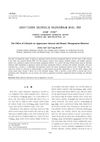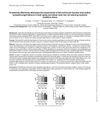August 2024 in “Food Bioscience” Bifidobacterium longum BB536 metabolites may help treat hair loss by repairing and promoting hair cell growth.
 July 2024 in “Deleted Journal”
July 2024 in “Deleted Journal” PRP improves FUE hair transplant results.
July 2024 in “Actas Dermo-Sifiliográficas” Finasteride and dutasteride do not significantly change beard thickness in men.
 June 2024 in “IntechOpen eBooks”
June 2024 in “IntechOpen eBooks” Myo-inositol-based treatments greatly improve pregnancy chances for women with PCOS.
 May 2024 in “Journal of Cosmetic and Laser Therapy”
May 2024 in “Journal of Cosmetic and Laser Therapy” Injectable platelet-rich fibrin improves hair growth and reduces hair loss in women.
 May 2024 in “Deleted Journal”
May 2024 in “Deleted Journal” Dutasteride effectively treats hair loss in men who don't respond to finasteride.
 April 2024 in “Diagnostics”
April 2024 in “Diagnostics” Most orthodontic patients with missing teeth also have hair disorders.
 April 2024 in “Journal of dermatology research reviews & reports”
April 2024 in “Journal of dermatology research reviews & reports” Using a laser helmet with Minoxidil works better for male hair loss than Minoxidil alone, with no extra side effects.
 April 2024 in “Food science & nutrition”
April 2024 in “Food science & nutrition” Many displaced schoolchildren in Cameroon are malnourished, with high rates of thinness, stunting, underweight, and deficiencies in iron and protein.
 April 2024 in “JAMA dermatology”
April 2024 in “JAMA dermatology” Oral minoxidil is as effective as topical minoxidil for male hair loss but has more side effects like excessive hair growth and headaches.

Toxoplasma gondii infection may increase testosterone levels in males.
 March 2024 in “Homœopathic Links”
March 2024 in “Homœopathic Links” Phosphorus homeopathy treatment led to complete hair regrowth in two Alopecia Areata patients.
 March 2024 in “INTERNATIONAL JOURNAL OF SCIENTIFIC RESEARCH”
March 2024 in “INTERNATIONAL JOURNAL OF SCIENTIFIC RESEARCH” PRP can effectively treat hair loss, especially with optimal platelet count.
 January 2024 in “Deleted Journal”
January 2024 in “Deleted Journal” Most mothers who get postpartum care are healthy during the postpartum period.
 January 2024 in “Frontiers in endocrinology”
January 2024 in “Frontiers in endocrinology” Treating early puberty with hormone therapy may increase the risk of polycystic ovary syndrome in adults.
 January 2024 in “American journal of clinical dermatology”
January 2024 in “American journal of clinical dermatology” Ritlecitinib is safe and well-tolerated for treating alopecia areata in patients aged 12 and older.

N793 may improve hair density in people with mild hair thinning.
 January 2024 in “Journal of Evidence-Based Integrative Medicine”
January 2024 in “Journal of Evidence-Based Integrative Medicine” Teak leaf extract may effectively and safely promote hair growth in males with androgenic alopecia.
 January 2024 in “Journal of Hard Tissue Biology”
January 2024 in “Journal of Hard Tissue Biology” A high-fat diet may weaken tongue structure by reducing certain protein genes.
 December 2023 in “Journal of the Korean Society of Cosmetology”
December 2023 in “Journal of the Korean Society of Cosmetology” People interested in aesthetics, personality, and social life care more about their appearance and beauty routines.
 December 2023 in “Journal of Cosmetic Dermatology”
December 2023 in “Journal of Cosmetic Dermatology” Baricitinib effectively and safely improves hair growth in patients with severe alopecia areata.
 December 2023 in “Frontiers in microbiology”
December 2023 in “Frontiers in microbiology” Mannan oligosaccharides improve raccoon dogs' fur quality and overall health.
 November 2023 in “Journal of Basic Microbiology”
November 2023 in “Journal of Basic Microbiology” Green-synthesized zinc oxide nanoparticles effectively inhibit common fungi found on human scalp hair.
 November 2023 in “Research Square (Research Square)”
November 2023 in “Research Square (Research Square)” Finasteride affects the male rat brain by reducing certain protein activation, but these effects may reverse after stopping the drug.
 November 2023 in “The journal of investigative dermatology/Journal of investigative dermatology”
November 2023 in “The journal of investigative dermatology/Journal of investigative dermatology” The article concludes that creating a detailed map of normal human skin at the single-cell level is important.
 November 2023 in “PubMed”
November 2023 in “PubMed” Naringenin and its combination with minoxidil significantly improved hair growth in mice.
 November 2023 in “Clinical, Cosmetic and Investigational Dermatology”
November 2023 in “Clinical, Cosmetic and Investigational Dermatology” Saw palmetto extract reduced hair loss and improved hair growth in people with hair thinning.
 November 2023 in “European heart journal”
November 2023 in “European heart journal” Finasteride improves heart function and balance in aging and obese male rats by reducing oxidative stress.
 June 2023 in “Journal of Cosmetic Dermatology”
June 2023 in “Journal of Cosmetic Dermatology” Finasteride 5mg daily is the most effective for female pattern hair loss, with higher doses of treatments generally more effective.
 June 2023 in “Journal of cosmetic dermatology”
June 2023 in “Journal of cosmetic dermatology” Both DPCP alone and with PRP are effective and safe for treating severe alopecia areata.



























